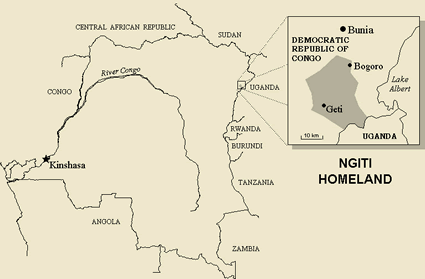The Ngiti people are a large group of persons who live on the fertile hill slopes of north-eastern Democratic Republic of Congo along the border with Uganda south of Lake Mobutu. They are self-sufficient agricultural people engaging in a wide range of farming activities as well as some animal husbandry. Farm products produce a balanced diet including maize, beans, various root crops, bananas and plantain. This diet is supplemented with milk and meat from the cattle and goat herds.
Land is owned communally by the village. When a man marries he is assigned a plot by the village elders which he retains so long as his family works it properly. Should he die or relocate his family, the land reverts to the village community property. Normally homes are along the ridges with the farm down the hillside. Very little development has reached these people.
School administration is done by church groups. The first three years of Primary school are taught in Kiswahili, then they switch over to French. Consequently a child who hears only the Ngiti language at home is presented with the problem of trying to learn his subjects in two entirely new languages. This includes trying to read, though no books are provided. Quite a few of the children cannot cope with this and consequently drop out before the end of Primary school. While school is considered mandatory, the parents are required to pay for uniforms, pencils and note book, an intolerable burden for many.
Several denominations have planted churches among the Ngiti population with maybe 50% of the people claiming Christianity. An alphabet has been created and several native speakers are about to begin Bible translation into their mother tongue. Scripture portions are now available. Other Ngiti people are needed to get involved in literacy work. Armed conflict in the area has hampered effort in translation and literacy and revealed the need for Scripture Use promotion.
Scripture Prayers for the Ngeti, South Lendu in Congo, Democratic Republic of.
| Profile Source: Anonymous |











